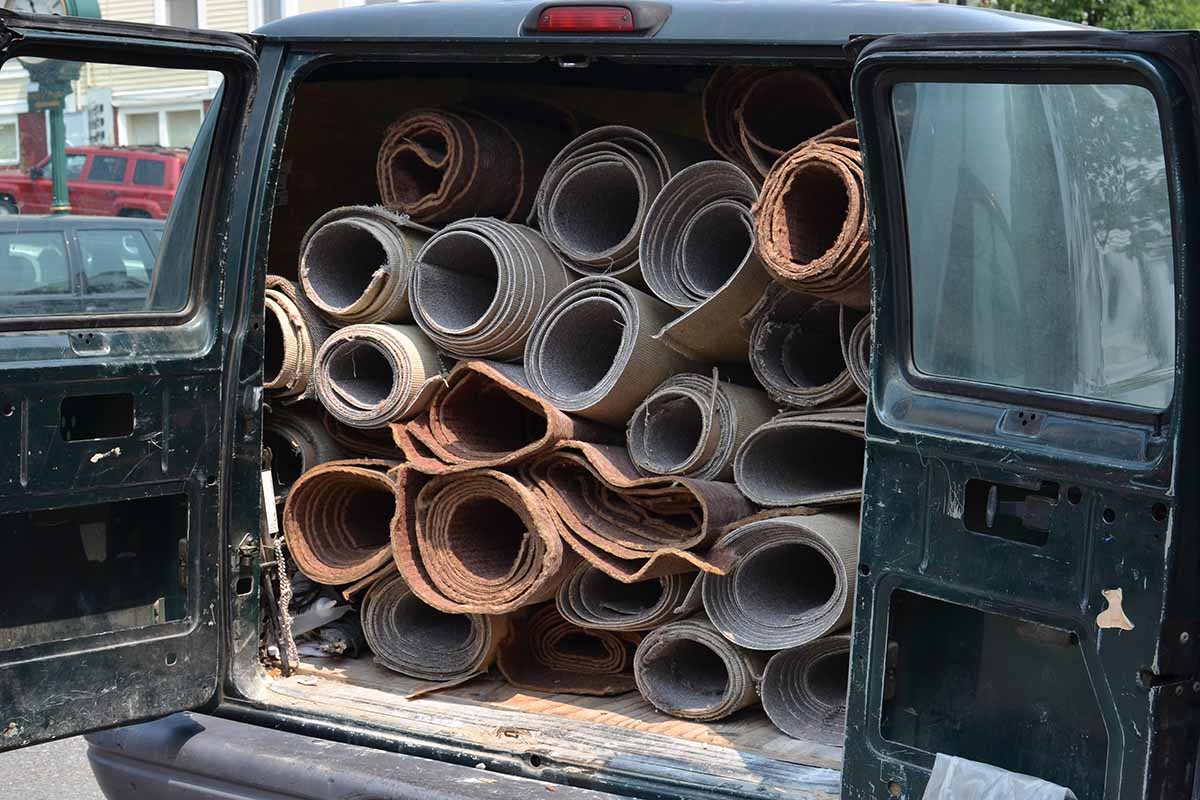
A bill passed in New York establishes goals for carpet recycling and post-consumer content, requires the creation of a collection network and more. | Steven Belanger/Shutterstock
New York is close to becoming the second state to require producers to fund carpet collection and recycling. Meanwhile, California regulators approved carpet fees that vary based on recycled content.
Bill clears legislature
Lawmakers in New York state have passed a bill creating an extended producer responsibility (EPR) program for carpet. The state Senate on May 5 voted 47-15 to pass A09279, which passed out of the state Assembly on April 27 in a 106-38 vote. The bill now heads to Gov. Kathy Hochul’s desk.
If signed, as it’s expected to be, the legislation would be only the second mandatory EPR bill to become law in the U.S., after California’s, according to the Product Stewardship Institute (PSI), an EPR advocacy group. It would be the first to cover artificial turf.
The bill would set goals for carpet recycling and post-consumer content, establish a collection network, require education and outreach efforts and phase out per- and polyfluoroalkyl substances (PFAS) chemicals in new carpet. It requires producers to finance and manage the collection and recycling system.
“We are very pleased to be part of the team that developed and passed this bill in New York,” Resa Dimino, managing partner of the Signalfire Group, stated in a press release. “This legislation – second in the nation – offers a strong model for other states looking to reduce waste and fight climate change by increasing carpet recycling.”
Support for NY bill leads to removal from board
Floordaily.net, a trade publication covering the carpet industry, reported that stewardship group Carpet America Recovery Effort (CARE) removed major companies from two of its board seats because they supported EPR bills in New York and Illinois (the Illinois bill did not pass this legislative session).
CARE, which manages the collection and recycling program under California’s mandatory program, opposes mandatory EPR programs. Floordaily reported that CARE kicked carpet recycling companies Aquafil USA and DC Foam Recycle off the board, saying their support for the bills violated CARE’s policy.
Aquafil collects carpet scraps in the U.S. and elsewhere and, using a depolymerization process at its ECONYL Regeneration Plant in Slovenia, recycles the nylon for use in textiles. DC Foam Recycle is a post-consumer nylon carpet collection company owned by Wellman Advanced Materials, which recycles the plastic into pellets for use in vehicles and other applications. DC Foam Recycle was one of the largest recipients of CARE’s voluntary subsidy program, which CARE canceled in April 2020, citing difficult business conditions brought on by the coronavirus pandemic.
After the removals, 15-year board member Sean Ragiel of New Jersey-based CarpetCycle resigned in protest, according to Floordaily.com.
California regulators approve goals
Meanwhile, in California, the Department of Resources Recycling and Recovery (CalRecycle) recently approved a CARE plan to impose different consumer fees, depending on whether the carpet is made with recycled content.
To fund CARE’s collection and recycling system, consumers will pay 33 cents per square yard of broadloom carpet with 10% or more recycled content and 35 cents per square yard of broadloom carpet with less than 10% recycled content. They’ll pay 48 cents per square yard of carpet tile with 10% or more recycled content and 50 cents per square yard of carpet tile with less than 10% recycled content.
CARE originally proposed the modulated fee structure in 2021 but CalRecycle staff objected to several details in the proposal, prompting CARE to revise the plan in February. CalRecycle Director Rachel Machi Wagoner approved the revised plan on April 22.
More stories about EPR/stewardship
- Ellen MacArthur Foundation sets 2030 plastics agenda
- Packaging policies require collaboration, harmonization
- RecycleOn Oregon opens first drop-off hard-to-recycle site